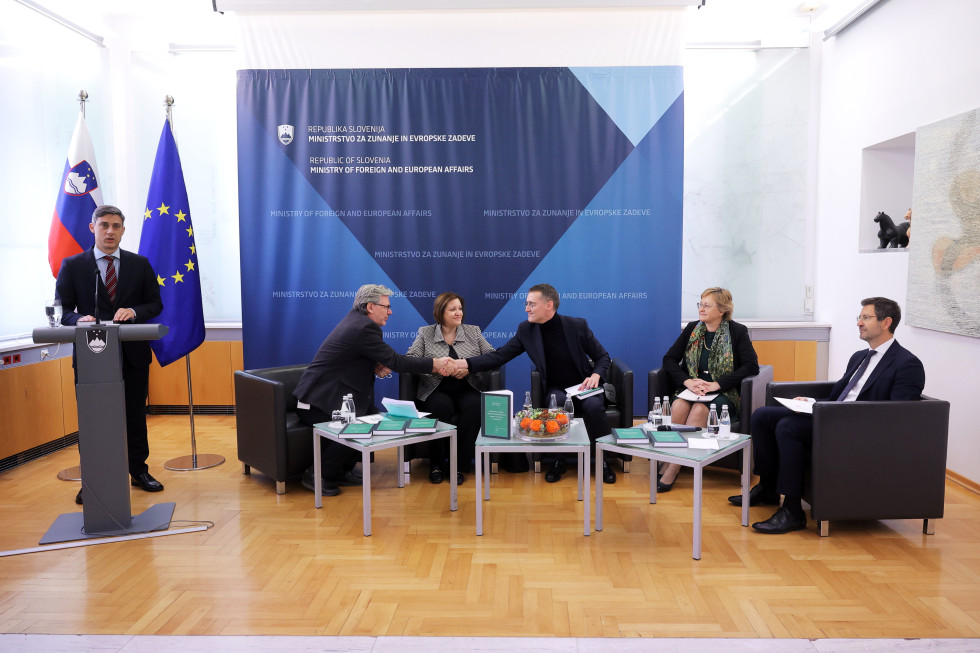Symposium on succession: Slovenia actively working towards full implementation of 2004 Agreement

Speakers at the Symposium on Succession Issues
"Resolving the outstanding succession issues is not about endlessly arguing about who is right or who is to blame for what happened, but about laying a good and solid foundation for cooperation between the successor states and the coexistence of our citizens in this wider area, and about establishing a sound basis for the economic development of the region. The stalemate in resolving these issues puts a strain on the relations between the successor states and often leads to conflicts," stressed Minister Tanja Fajon in her written address. Slovenia must therefore intensify its activities in the international community to ensure that the importance of resolving the succession issues is fully recognised, both in terms of good neighbourly relations and European values, and in terms of maintaining international peace and security, she added. Last year, Minister Fajon promoted a dialogue on succession issues at the level of foreign ministers, and it was agreed that they would meet again in September next year in Bosnia and Herzegovina. "Regular ministerial dialogue is a good way to start developing a common political will to complete the succession process," Minister Fajon wrote.
One of the authors, Dr Polak Petrič, introduced the book by saying that the aim of the monograph was to present a comprehensive record of views and activities on succession since Slovenia's independence, thus bringing together the valuable knowledge in Slovenia on this subject. She said it was a significant historical achievement that Slovenian legal arguments stating that the former Yugoslavia had disintegrated and not that Slovenia had seceded, had been taken into account. The main challenge in writing the book was to maintain an academic distance from the issues, including the politically sensitive ones, with which she had been involved in her previous role as High Representative for Succession Issues. Her co-author Dr Pajnkihar added that there are not many such examples in history, but the case studies he has included show where succession issues are legal and where they are not.
In addition to the authors, the symposium was attended by Prof Mojmir Mrak, Mr Vojko Volk, State Secretary in the Prime Minister’s Office, and Ms Mateja Vraničar Erman, High Representative for Succession Issues. Dr France Arhar, former Governor of the Bank of Slovenia, Dr Mirjam Škrk, Professor of International Law, who has been involved in various succession issues since Slovenia's independence, and former ambassadors also spoke at the debate and shared their experiences in the field of succession. They all agreed that this year's important milestone, the 20th anniversary of the entry into force of the Agreement on Succession Issues, was a reminder to the successor states that it was high time to finally resolve the outstanding issues. The full implementation of the Agreement, which is defined in the Declaration on the Foreign Policy of the Republic of Slovenia as one of the priorities of its foreign policy, is important for Slovenia because it is a matter of respecting the principles of the rule of law and complying with international legal obligations.
"This book is an excellent tool for finding innovative solutions in the current situation of succession issues in the territory of the former Yugoslavia," said the High Representative of the Republic of Slovenia for Succession Issues, Ms Mateja Vraničar Erman. She pointed out that the key problem today is the lack of political will in the successor states to resolve the remaining succession issues, and that without Slovenia's initiative, activities would already have stalled. That is why it is so important for the Minister of Foreign and European Affairs to keep this issue on the political agenda, including in the foreign policy strategy, and to address it in an active way. The right lever for resolving these issues is to find current common political objectives in the successor states, which are enshrined in the European Union Enlargement Reports because of the aspirations of these states to join the European Union and the importance of resolving the open questions between them, she added. "The disregard and ignorance of succession issues in the international arena makes it necessary to raise awareness of the importance of resolving such issues. This is in the interest of a strong European Union and of peace and security in the world," said Ms Vraničar Erman. According to State Secretary Volk, solving the succession issue is vital for Europe, because it will also determine its future.
The symposium was organised by the Diplomatic Academy of the Slovenian Ministry of Foreign and European Affairs, headed by Dr Andraž Zidar, who is also the editor-in-chief of the International Law Collection, in which the book was published. The debate was chaired by Dr Marko Rakovec, Director-General of the Directorate for International Law and Protection of Interests at the Slovenian Ministry of Foreign and European Affairs.

